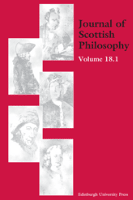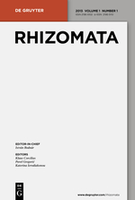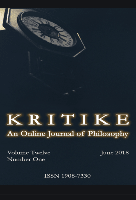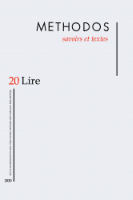
Archai-Revista de Estudos Sobre as Origens do Pensamento Ocidental
Scope & Guideline
Illuminating the Pathways of Western Intellectual Evolution.
Introduction
Aims and Scopes
- Philosophical Textual Analysis:
The journal focuses on in-depth analyses of classical philosophical texts, including works by Plato, Aristotle, and other ancient thinkers, exploring their arguments, methodologies, and implications. - Interdisciplinary Approaches:
It encourages interdisciplinary perspectives, integrating insights from history, literature, and cultural studies to enrich the understanding of philosophical concepts. - Historical Contextualization:
A significant aim is to contextualize ancient philosophical ideas within their historical frameworks, examining how these ideas influenced subsequent intellectual developments. - Gender Studies in Antiquity:
The journal increasingly includes discussions on gender, examining the roles and representations of women in ancient philosophy and society. - Comparative Philosophy:
There is a focus on comparative studies between Western and Eastern philosophical traditions, highlighting similarities and differences in thought processes and conceptual frameworks.
Trending and Emerging
- Ethics and Moral Philosophy:
Recent publications emphasize ethical considerations in ancient texts, particularly Aristotelian and Stoic ethics, reflecting a growing interest in how these philosophies can inform modern moral dilemmas. - Gender and Philosophy:
There is an increasing trend towards exploring gender dynamics in ancient texts, highlighting women's roles and contributions to philosophy, which indicates a broader inclusivity in scholarly discourse. - Philosophy and Politics:
Intersections of philosophy and political theory are becoming more prominent, with analyses of how ancient philosophies can inform contemporary political thought and practice. - Cultural and Environmental Analysis:
Emerging themes include the examination of environmental philosophy and its roots in ancient thought, reflecting a modern concern for ecological issues through a philosophical lens. - Reception Studies:
There is a growing focus on the reception of ancient philosophical ideas throughout history, examining how they have been interpreted and reinterpreted in different cultural contexts.
Declining or Waning
- Mythological Studies:
There has been a noticeable decline in articles specifically focusing on mythological analysis and its philosophical implications, suggesting a shift towards more direct philosophical discourse. - Historical Figures Outside Western Philosophy:
The exploration of non-Western historical figures and their philosophies has decreased, indicating a potential narrowing of focus primarily on Western philosophical traditions. - Traditional Metaphysical Debates:
Debates centered around classical metaphysical issues, such as substance and essence, are appearing less frequently, as the journal pivots to contemporary interpretations and applications of ancient thought.
Similar Journals

Journal of Scottish Philosophy
Engaging Minds in the Rich Tapestry of ScotlandWelcome to the Journal of Scottish Philosophy, a renowned platform for scholarship in the fields of Cultural Studies, History, and Philosophy, published by Edinburgh University Press. With its impactful contributions since 2003, this journal proudly holds a prestigious Q1 ranking in all three categories as of 2023, reflecting its commitment to advancing critical discussions in Scottish philosophical thought and its broader cultural contexts. The journal engages a diverse readership by providing rigorously peer-reviewed research, innovative insights, and theoretical advancements that explore the rich tapestry of Scotland's intellectual heritage. Without the restrictions of open access, the journal remains a pivotal resource for researchers, professionals, and students eager to delve into the complexities of Scottish philosophy, fostering a vibrant dialogue across disciplines. Interested authors can contribute their manuscripts to join the distinguished ranks of works featured in this esteemed publication.

Revista de Filosofia Aurora
Empowering Scholars Through Open Access PhilosophyRevista de Filosofia Aurora, an esteemed journal in the field of Philosophy, is published by the Pontificia Universidade Catolica do Parana in Brazil. With an ISSN of 2965-1557 and E-ISSN of 2965-1565, this Open Access journal has been dedicated to the dissemination of philosophical inquiry and discourse since 2003. As a reputable Q3 journal as per the 2023 category quartiles, it serves as a vital platform for scholars, enhancing access to contemporary philosophical discussions and contributions. The journal accepts a diverse range of articles, including theoretical explorations and practical applications within the field, inviting submissions from dedicated researchers and practitioners around the globe. Its commitment to open access ensures that scholarly work reaches a wide audience, fostering further exploration and dialogue within the philosophical community. Located in the heart of Curitiba, Brazil, the journal continuously strives to connect local and international perspectives, making significant contributions to the global philosophical landscape.

Rhizomata-A Journal for Ancient Philosophy and Science
Delving Deep into the Intersections of Philosophy and ScienceRhizomata - A Journal for Ancient Philosophy and Science is a key academic publication dedicated to exploring the intricate intersections of ancient philosophical thought and scientific inquiry. Published by WALTER DE GRUYTER GMBH, this journal has established a significant presence in the field since its inception in 2013, with its convergence years extending to 2024. With a strong Q2 ranking in both the History and Philosophy of Science and Philosophy categories, it offers rigorous peer-reviewed articles that engage with the historical context and evolution of scientific ideas. The journal enjoys a commendable standing in Scopus rankings, positioned at 310 out of 806 in Philosophy, and 126 out of 223 in History and Philosophy of Science, showcasing its relevance and impact within these disciplines. While currently not an Open Access publication, the journal is instrumental for researchers, professionals, and students eager to delve into the foundational theories that have shaped modern scientific discourse. Join the dialogue and contribute to the vibrant academic community by engaging with Rhizomata, where ancient wisdom meets contemporary thought.

Antichthon
Advancing Scholarship in Classical StudiesAntichthon, published by Cambridge University Press, stands as a vital platform within the field of Classics. Established in 1986, the journal has evolved to encompass scholarly contributions that explore various dimensions of classical studies, including literature, history, and cultural studies. With its rich publication history extending from 2011 to 2023, Antichthon boasts a commendable Q2 ranking in the latest 2023 Category Quartiles for Classics, reflecting its significant impact in the academic community. Although the journal does not offer an Open Access option, it continues to engage researchers and academics with its curated selection of articles, reviews, and critical insights. Located at the Edinburgh Building, Shaftesbury Rd, Cambridge, England, this journal remains an essential resource for both established scholars and students aiming to deepen their understanding of classical antiquity and its enduring relevance.

Kritike-An Online Journal of Philosophy
Empowering Scholars to Share Transformative IdeasKritike-An Online Journal of Philosophy is a prominent open-access publication dedicated to the exploration and advancement of philosophical discourse. Published by University Santo Tomas, Faculty of Arts & Letters in the Philippines, this journal has been a valuable resource for philosophical scholarship since its inception in 2007, fostering accessibility and intellectual exchange across the globe. With an impact factor that reflects its growing reputation, and classified in the Q2 category of Philosophy as of 2023, Kritike serves as a platform for both established and emerging scholars. The journal’s ranking in the Scopus database, where it holds the 663rd position out of 806 in the Arts and Humanities – Philosophy category, underlines its commitment to contributing meaningful insights within the field. Ensuring open access since 2007 enhances its reach, making critical philosophical works readily available to researchers, professionals, and students alike. As the journal converges into a new era from 2018 to 2024, it continues to uphold its mission of facilitating rigorous scholarly dialogue and enriching the philosophical landscape.

QUADERNI URBINATI DI CULTURA CLASSICA
Exploring the Rich Tapestry of Classics and LinguisticsQUADERNI URBINATI DI CULTURA CLASSICA is a distinguished academic journal dedicated to the interdisciplinary exploration of Classics, Linguistics, and Literary Theory. Published by ACCADEMIA EDITORIALE PISA-ROMA, this journal serves as a vital scholarly platform for researchers and professionals alike, facilitating in-depth discussions and analyses that contribute to these evolving fields. With an ISSN of 0033-4987 and an E-ISSN of 1724-1901, it boasts a robust Scopus ranking, placing it within the second quartile in Classics and the third quartile in related disciplines as of 2023. Although it is not an open-access journal, QUADERNI URBINATI DI CULTURA CLASSICA remains essential for those engaged in the study of language, literature, and classical cultures, encouraging scholarly exchange and innovation from its base in Rome, Italy. Researchers and students will find valuable insights and methodologies within its pages, making it a key resource for fostering academic growth and understanding.

Beytulhikme-An International Journal of Philosophy
Empowering Minds Through Open Access ScholarshipBeytulhikme-An International Journal of Philosophy is a distinguished publication dedicated to the exploration and dissemination of philosophical scholarship. Published by Beytulhikme Felsefe Cevresi, this journal serves as a platform for researchers, academics, and students to engage with contemporary philosophical discourses and historical inquiries. With its commitment to open access, Beytulhikme ensures that valuable philosophical insights are readily available to a global audience. The journal welcomes a diverse range of submissions, including theoretical papers, critical reviews, and interdisciplinary work that reflects the dynamic nature of philosophical research today. Located in Ankara, Turkiye, Beytulhikme plays a pivotal role in fostering a deeper understanding of philosophical concepts and methods, thus contributing to the academic community and enriching scholarly dialogue. As a key resource for professionals in the field, Beytulhikme not only encourages innovative thinking but also promotes a comprehensive examination of both Eastern and Western philosophical traditions.

Revista de Filosofia La Plata
Connecting Scholars Across BordersRevista de Filosofia La Plata is a distinguished academic journal dedicated to the exploration and dissemination of philosophical thought and research. Published by the Universidad Nacional de La Plata within the Facultad de Humanidades y Ciencias de la Educación, this journal serves as a vital platform for scholars, practitioners, and students interested in various branches of philosophy, including but not limited to ethics, metaphysics, and social philosophy. With its commitment to Open Access, Revista de Filosofia La Plata ensures that valuable philosophical insights and discussions are accessible to a global audience, fostering rigorous debate and academic inquiry. Located in the heart of Buenos Aires, Argentina, this journal not only enhances regional scholarly dialogue but also contributes to the international landscape of philosophical research. Engaging with contemporary and classical philosophical issues, it aims to inspire new perspectives and guide future ethical and theoretical considerations in academia and beyond.

Methodos-Savoirs et Textes
Fostering Interdisciplinary Connections in Academic ResearchMethodos-Savoirs et Textes is a distinguished peer-reviewed academic journal published by UNIV LILLE III-CHARLES GAULLE, UMR SAVOIRS TEXTES LANGAGE. With a focus on interdisciplinary studies in the fields of textual analysis, knowledge dissemination, and language dynamics, this journal serves as an essential platform for researchers, professionals, and students aiming to contribute to and engage with contemporary scholarly discourse. Since its transition to Open Access in 2001, Methodos-Savoirs et Textes has dedicated itself to enhancing the visibility and accessibility of research outputs, encouraging a wider reach and impact within the academic community. The journal is respected for its commitment to rigor and innovation, making it an invaluable resource for those interested in the intersections of text, language, and knowledge. For further exploration of groundbreaking research, you can access the journal online at its official website, where you will find a range of articles that reflect the latest developments in the field.

Anales del Seminario de Historia de la Filosofia
Unveiling the Threads of Thought Through TimeAnales del Seminario de Historia de la Filosofia, published by UNIV COMPLUTENSE MADRID, SERVICIO PUBLICACIONES, is a distinguished open-access journal that has been contributing to the fields of History and Philosophy since 1980. With an ISSN of 0211-2337 and E-ISSN 1988-2564, it aims to provide a scholarly platform for the dissemination of original research and critical reviews pertinent to the historiography of philosophy and its influences on modern thought. The journal features a robust open-access model, ensuring that all published content is readily available to researchers, students, and professionals worldwide. The journal currently enjoys recognition within its field, classified within the Q3 quartile in History and Philosophy of Science and Q2 quartile in Philosophy as of 2023. Positioned within the heart of Spain, the journal facilitates international academic dialogue and invites submissions that explore the intersection of past philosophical contexts and contemporary issues. Whether you are a seasoned scholar or a budding philosopher, Anales del Seminario de Historia de la Filosofia aims to foster a deeper understanding of philosophical traditions and their ongoing relevance in today’s discourse.